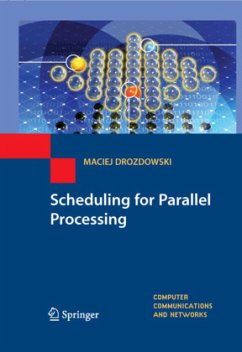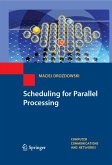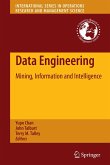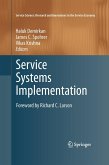This book presents scheduling models for parallel processing, problems defined on the grounds of certain scheduling models, and algorithms solving the scheduling problems. The book also provides helpful generalizations about scheduling models. Features: Introduces the fundamental scheduling concepts; Discusses the technological aspects of scheduling for parallel processing; Presents the notions, concepts, and algorithms that are most immediately applicable in parallel processing; Examines the parallel task model; Outlines the methodology of computational complexity theory and introduces the basic metrics of parallel application performance; Explores scheduling with communication delays; Examines scheduling divisible loads in systems with limited memory, various interconnection types, and cost of usage; Includes detailed illustrations, a bibliography, and a notation section. This text will be valuable for researchers in parallel computing, operating systems, management science, and applied mathematics.
Overview and Goals This book is dedicated to scheduling for parallel processing. Presenting a research ?eld as broad as this one poses considerable dif?culties. Scheduling for parallel computing is an interdisciplinary subject joining many ?elds of science and te- nology. Thus, to understand the scheduling problems and the methods of solving them it is necessary to know the limitations in related areas. Another dif?culty is that the subject of scheduling parallel computations is immense. Even simple search in bibliographical databases reveals thousands of publications on this topic. The - versity in understanding scheduling problems is so great that it seems impossible to juxtapose them in one scheduling taxonomy. Therefore, most of the papers on scheduling for parallel processing refer to one scheduling problem resulting from one way of perceiving the reality. Only a few publications attempt to arrange this ?eld of knowledge systematically. In this book we will follow two guidelines. One guideline is a distinction - tween scheduling models which comprise a set of scheduling problems solved by dedicated algorithms. Thus, the aim of this book is to present scheduling models for parallel processing, problems de?ned on the grounds of certain scheduling models, and algorithms solving the scheduling problems. Most of the scheduling problems are combinatorial in nature. Therefore, the second guideline is the methodology of computational complexity theory. Inthisbookwepresentfourexamplesofschedulingmodels. Wewillgodeepinto the models, problems, and algorithms so that after acquiring some understanding of them we will attempt to draw conclusions on their mutual relationships.
Overview and Goals This book is dedicated to scheduling for parallel processing. Presenting a research ?eld as broad as this one poses considerable dif?culties. Scheduling for parallel computing is an interdisciplinary subject joining many ?elds of science and te- nology. Thus, to understand the scheduling problems and the methods of solving them it is necessary to know the limitations in related areas. Another dif?culty is that the subject of scheduling parallel computations is immense. Even simple search in bibliographical databases reveals thousands of publications on this topic. The - versity in understanding scheduling problems is so great that it seems impossible to juxtapose them in one scheduling taxonomy. Therefore, most of the papers on scheduling for parallel processing refer to one scheduling problem resulting from one way of perceiving the reality. Only a few publications attempt to arrange this ?eld of knowledge systematically. In this book we will follow two guidelines. One guideline is a distinction - tween scheduling models which comprise a set of scheduling problems solved by dedicated algorithms. Thus, the aim of this book is to present scheduling models for parallel processing, problems de?ned on the grounds of certain scheduling models, and algorithms solving the scheduling problems. Most of the scheduling problems are combinatorial in nature. Therefore, the second guideline is the methodology of computational complexity theory. Inthisbookwepresentfourexamplesofschedulingmodels. Wewillgodeepinto the models, problems, and algorithms so that after acquiring some understanding of them we will attempt to draw conclusions on their mutual relationships.
From the reviews: "It will be useful not only to researchers in the fields of applied mathematics and computer science (CS), but also to researchers in other fields who want to develop parallel algorithms and applications. ... Overall, this unique book combines the characteristics of a teaching tool and a reference. ... The comprehensive bibliography, helpful notation sections, and clear style make it a valuable resource for scientists and engineers in other fields too, including computational physics and computational chemistry." (Alexander Izanov, ACM Computing Reviews, September, 2010) "The book presents in a systematical way the interdisciplinary subject of scheduling for parallel processing. ... The text is addressed to researchers in parallel computing and applied mathematics. It can be used for advanced lectures in parallel computing. The algorithms that are presented may be interesting for developers of parallel applications. Many of them are based on heuristics for solving hard combinatorial problems." (Dana Petcu, Zentralblatt MATH, Vol. 1187, 2010)








